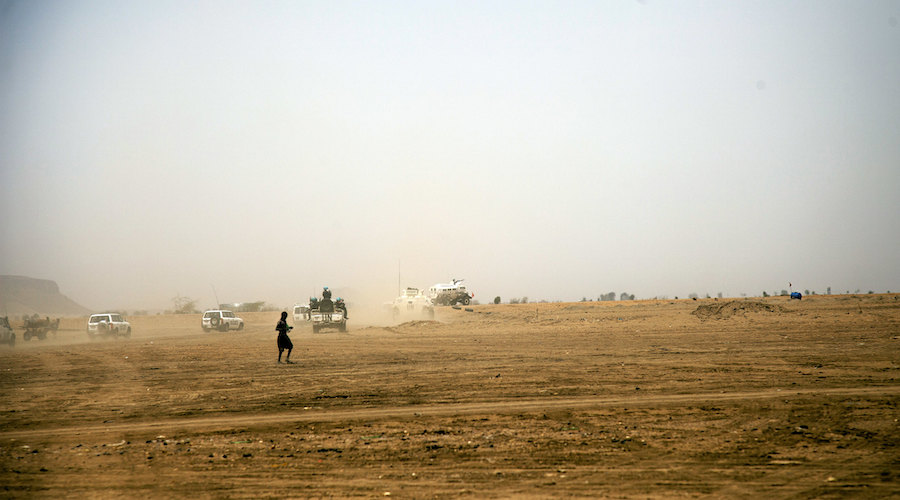Reuters | May 25, 2023 |

Stock image.
The United Arab Emirates has become a key trade hub for Russian gold since Western sanctions over Ukraine cut Russia’s more traditional export routes, Russian customs records show.

The records, which contain details of nearly a thousand gold shipments in the year since the Ukraine war started, show the Gulf state imported 75.7 tonnes of Russian gold worth $4.3 billion – up from just 1.3 tonnes during 2021.
China and Turkey were the next biggest destinations, importing about 20 tonnes each between Feb. 24, 2022 and March 3, 2023. With the UAE, the three countries accounted for 99.8% of the Russian gold exports in the customs data for this period.
In the days after the Ukraine conflict started, many multinational banks, logistics providers and precious metal refiners stopped handling Russian gold, which had typically been shipped to London, a gold trading and storage hub.
The London Bullion Market Association banned Russian bars made from March 7, 2022, and by the end of August, Britain, the European Union, Switzerland, the United States, Canada and Japan had all banned imports of Russian bullion.
The export records show, however, that Russian gold producers quickly found new markets in countries that had not imposed sanctions on Moscow, such as the UAE, Turkey and China.
Louis Marechal, a gold sourcing expert at the Organisation for Economic Co-operation and Development said there was a risk Russian gold could be melted down and recast and then find its way back into US and European markets with its origin masked.
“If the Russian gold comes in, is recast by a local refiner, sourced by a local bank or trader and then sold on into the market, there you have a risk,” he said. “This is why carrying out due diligence is instrumental to end buyers wishing to ensure they respect sanctions regimes.”
The UAE government’s Gold Bullion Committee said the state operated with clear and robust processes against illicit goods, money laundering and sanctioned entities.
“The UAE will continue to trade openly and honestly, with its international partners, in compliance with all current international norms as set down by the United Nations,” it said.
Thriving gold hub
In a bid to further isolate Russia, Washington has warned countries, including the UAE and Turkey, they could lose access to G7 markets if they do business with entities subject to US sanctions.
The data reviewed by Reuters does not suggest there has been any violation of US sanctions by those countries.
The US Treasury, whose Office of Foreign Assets Control enforces sanctions, did not respond to requests for comment.
The shipments in the customs data, supplied to Reuters by a commercial provider, show exports of 116.3 tonnes between Feb. 24, 2022 and March 3 this year, although consultant Metals Focus estimates Russia produced 325 tonnes of gold in 2022.
The rest of the gold dug in Russia likely either stayed in the country or was exported in transactions not included in the records. Reuters was unable to determine what proportion of Russia’s total gold exports were covered by the data.
Most of the Russian gold shipments to China went to Hong Kong. China’s Ministry of Foreign Affairs said the country’s cooperation with Russia “shall be free from disruption or coercion from any third party”.
Turkey’s finance ministry did not respond to requests for comment. The Russian government, customs authority and central bank did not respond to requests for comment about gold exports.
The shift in Russian exports away from London is not seen as a major blow as the hub is not reliant on Russia. In 2021, for example, gold from Russia accounted for 29% of London’s imports but in 2018 it made up just 2%, British trade data shows.
The UAE, meanwhile, has long had a thriving gold industry. Trade data show it imported about 750 tonnes of pure gold a year on average between 2016 and 2021 – meaning the shipments in the Russian records would only account for about 10% of its imports.
The UAE is a major exporter of bullion and jewellery.
Discount prices
The manager of one company that shipped large amounts of Russian gold to the UAE told Reuters that Russian firms had been selling bullion there at a discount of about 1% to global benchmark prices, offering an incentive to trade.
The manager, who spoke on condition of anonymity, said most of the gold his firm shipped to the UAE was destined for refineries, where it would be melted down and recast.
Reuters asked four of Russia’s largest gold miners for comment. Nordgold and Norilsk Nickel declined to comment. Polyus and Polymetal did not respond.
In many cases, the customs records show only shippers or traders involved in the transactions, not the end buyer, which could be a refiner, jeweller or investor.
The records show the biggest handler of Russian gold exported to the UAE was Temis Luxury Middle East, a Dubai subsidiary of French logistics firm Temis Luxury involved in the shipment of 15.6 tonnes valued at $863 million from April 2022 to March 3.
Broca Houy, head of compliance at Temis Luxury Group, said the company “fully complies with the laws and regulations of the United Arab Emirates for freight forwarder business”.
He said Temis did not buy Russian gold and only accepted transport orders from operators not subject to US sanctions.
Asked about the shipments, France’s finance ministry said it would not comment on individual cases but it was very committed to the application of sanctions.
European sanctions do not typically apply to overseas subsidiaries, so European firms whose subsidiaries were involved in shipments of Russian gold to the UAE, Turkey or Hong Kong would not have necessarily broken any laws, said Tan Albayrak, a sanctions lawyer at Reed Smith in London.
The second-largest handler of Russian bullion in the UAE, with involvement in shipments of 14.6 tonnes worth $820 million, was logistics firm Transguard, part of the Emirates Group, the airline-to-hotels company owned by the Gulf state’s wealth fund.
Emirates said it had not bought any Russian gold, operated in full compliance with applicable laws and had now stopped transporting it.
“Due to recent regulatory developments, Transguard is no longer providing logistics services pertaining to shipments of gold to or from Russia,” it said.
In Hong Kong, most Russian gold shipments were handled by Vpower Finance Security Hong Kong Ltd, a Chinese logistics company. It was involved in the import of 20.5 tonnes of gold worth $1.2 billion between May 2022 and March 3, the records show.
Vpower Finance Security did not respond to requests for comment.
(Reporting by Peter Hobson; Additional reporting by Layli Foroudi in Paris and Beijing Newsroom; Editing by David Clarke)
Conflict brings Sudan’s lucrative official gold trade to a halt
Bloomberg News | May 22, 2023 |

Sudan. (Reference image by UNAMID, Flickr).
Sudan’s official gold industry, the country’s largest revenue earner, has totally collapsed due to a spiraling month-old conflict in the North African nation, the head of the state-run mining company said.

Mubarak Ardol, general director of the Sudanese Mineral Resources Limited Co., said exports have ground to a halt, processing equipment has been damaged and the headquarters of several gold companies have been looted in the capital, Khartoum. Sudan officially exported 34.5 tons of gold worth over $2 billion last year.
But Ardol said it’s doubtful “even an ounce” has left the country since fighting between Sudan’s army and the paramilitary Rapid Support Forces broke out on April 15. More than 600 people have died and thousands more have been injured since, according to the World Health Organization.
Read More: How a sanctioned Russian company gained access to Sudan’s gold
Morocco’s most valuable metal miner, Managem, has halted production at its northeastern Wadi Gabgaba gold mine and also repatriated its workers, local media outlet Medias24 reported. The stock of the company fell by as much as 13.7% after the start of the violence, although it later recouped some of those losses.
Although both warring parties signed an agreement to protect civilians and facilitate the delivery of humanitarian aid last week in Jeddah, Saudi Arabia, fighting has continued to rage, according to interviews with residents and internal UN security documents seen by Bloomberg.
System shuttered
Ardol, whose job is to regulate and enforce safety standards for the Sudanese gold market, said that while producers are still extracting gold ore, key processing sites have been destroyed by the conflict while the financial and customs systems have shut down.
“From upstream to downstream, all of it is now damaged,” he said by phone from Sudan. “People are not able to export due to the process of sending the money. The banks are closed, the central bank is closed, the refinery is not accessible.”
Gold is an important revenue source for Sudan’s government, via companies including Australia’s Perseus Mining and Dubai-based Alliance for Mining Co. Ltd. But the vast majority of its production is smuggled out of the country, usually to foreign processing centers, according to Sudan’s finance ministry.
Both the RSF and the army have major stakes in Sudan’s gold industry and are accused by activists and rights groups of smuggling large amounts of illicit gold outside the country. The Russian mercenary company Wagner Group has also been linked to a gold processing facility north of Khartoum.
But it is unclear whether either side has been able to move the minerals out from remote air fields to fund their operations.
While the authorities in Khartoum stress the security forces control the country’s frontiers, “the smuggling of vehicles, alcohol, drugs, cosmetics and gold, as well as trafficking in arms and persons” is widespread across Sudan’s borders with South Sudan, the Central African Republic, Chad and Libya, a United Nations panel said in a report last year.
(By Simon Marks, with assistance from Souhail Karam)
Bloomberg News | May 22, 2023 |

Sudan. (Reference image by UNAMID, Flickr).
Sudan’s official gold industry, the country’s largest revenue earner, has totally collapsed due to a spiraling month-old conflict in the North African nation, the head of the state-run mining company said.

Mubarak Ardol, general director of the Sudanese Mineral Resources Limited Co., said exports have ground to a halt, processing equipment has been damaged and the headquarters of several gold companies have been looted in the capital, Khartoum. Sudan officially exported 34.5 tons of gold worth over $2 billion last year.
But Ardol said it’s doubtful “even an ounce” has left the country since fighting between Sudan’s army and the paramilitary Rapid Support Forces broke out on April 15. More than 600 people have died and thousands more have been injured since, according to the World Health Organization.
Read More: How a sanctioned Russian company gained access to Sudan’s gold
Morocco’s most valuable metal miner, Managem, has halted production at its northeastern Wadi Gabgaba gold mine and also repatriated its workers, local media outlet Medias24 reported. The stock of the company fell by as much as 13.7% after the start of the violence, although it later recouped some of those losses.
Although both warring parties signed an agreement to protect civilians and facilitate the delivery of humanitarian aid last week in Jeddah, Saudi Arabia, fighting has continued to rage, according to interviews with residents and internal UN security documents seen by Bloomberg.
System shuttered
Ardol, whose job is to regulate and enforce safety standards for the Sudanese gold market, said that while producers are still extracting gold ore, key processing sites have been destroyed by the conflict while the financial and customs systems have shut down.
“From upstream to downstream, all of it is now damaged,” he said by phone from Sudan. “People are not able to export due to the process of sending the money. The banks are closed, the central bank is closed, the refinery is not accessible.”
Gold is an important revenue source for Sudan’s government, via companies including Australia’s Perseus Mining and Dubai-based Alliance for Mining Co. Ltd. But the vast majority of its production is smuggled out of the country, usually to foreign processing centers, according to Sudan’s finance ministry.
Both the RSF and the army have major stakes in Sudan’s gold industry and are accused by activists and rights groups of smuggling large amounts of illicit gold outside the country. The Russian mercenary company Wagner Group has also been linked to a gold processing facility north of Khartoum.
But it is unclear whether either side has been able to move the minerals out from remote air fields to fund their operations.
While the authorities in Khartoum stress the security forces control the country’s frontiers, “the smuggling of vehicles, alcohol, drugs, cosmetics and gold, as well as trafficking in arms and persons” is widespread across Sudan’s borders with South Sudan, the Central African Republic, Chad and Libya, a United Nations panel said in a report last year.
(By Simon Marks, with assistance from Souhail Karam)
Polymetal plays down scope of sanctions as London-listed shares tank
Reuters | May 22, 2023 |

Svetloye mine – Image courtesy of Polymetal.
Gold producer Polymetal International PLC sought to play down the impact of US sanctions on its Russian operations as its London-listed shares tanked on Monday, emphasizing that the restrictions did not affect its business outside Russia.

The US State Department on Friday included Polymetal’s Russian business and Polyus – the largest gold producers in Russia – on its latest list of sanctions targets, aiming to punish Moscow for its invasion of Ukraine.

Polymetal’s Russian operations accounted for around two-thirds of the group’s revenue in 2022.
Shares in the company, which closed 8.4% lower on Friday, slid even further on Monday, at one point losing almost 40% on the day. By 1016 GMT they were around 12% lower.
The US Treasury Department’s Office of Foreign Assets Control (OFAC) on Friday placed blocking sanctions on Russia-based JSC Polymetal and any entities in which it holds a majority stake, but made clear that the sanctions did not target Jersey-based Polymetal International.
“JSC Polymetal is a legal entity registered in the Russian Federation which acts, amongst other things, as the holding company for the group’s assets located in the Russian Federation,” Polymetal International said in a statement.
“(It) does not have any operations outside of the Russian Federation.”
“Neither the company, its subsidiaries nor its affiliates are designated as sanctions targets of the UK or the EU, with the exception solely of the company’s Russian subsidiaries.”
Polyus on Monday said it considered all sanctions imposed on it and its subsidiaries as unjustified, and would examine the decisions and whether it should appeal.
Polymetal is seeking to re-domicile from Jersey to Kazakhstan and shift its primary listing from London to Astana to allow it to advance plans to separate its Russian and Kazakh businesses next year.
On Monday Polymetal International said it remained committed to pursuing its re-domiciliation, which is subject to shareholder approval.
(By Alexander Marrow; Editing by Jan Harvey)
Reuters | May 22, 2023 |

Svetloye mine – Image courtesy of Polymetal.
Gold producer Polymetal International PLC sought to play down the impact of US sanctions on its Russian operations as its London-listed shares tanked on Monday, emphasizing that the restrictions did not affect its business outside Russia.

The US State Department on Friday included Polymetal’s Russian business and Polyus – the largest gold producers in Russia – on its latest list of sanctions targets, aiming to punish Moscow for its invasion of Ukraine.

Polymetal’s Russian operations accounted for around two-thirds of the group’s revenue in 2022.
Shares in the company, which closed 8.4% lower on Friday, slid even further on Monday, at one point losing almost 40% on the day. By 1016 GMT they were around 12% lower.
The US Treasury Department’s Office of Foreign Assets Control (OFAC) on Friday placed blocking sanctions on Russia-based JSC Polymetal and any entities in which it holds a majority stake, but made clear that the sanctions did not target Jersey-based Polymetal International.
“JSC Polymetal is a legal entity registered in the Russian Federation which acts, amongst other things, as the holding company for the group’s assets located in the Russian Federation,” Polymetal International said in a statement.
“(It) does not have any operations outside of the Russian Federation.”
“Neither the company, its subsidiaries nor its affiliates are designated as sanctions targets of the UK or the EU, with the exception solely of the company’s Russian subsidiaries.”
Polyus on Monday said it considered all sanctions imposed on it and its subsidiaries as unjustified, and would examine the decisions and whether it should appeal.
Polymetal is seeking to re-domicile from Jersey to Kazakhstan and shift its primary listing from London to Astana to allow it to advance plans to separate its Russian and Kazakh businesses next year.
On Monday Polymetal International said it remained committed to pursuing its re-domiciliation, which is subject to shareholder approval.
(By Alexander Marrow; Editing by Jan Harvey)
No comments:
Post a Comment